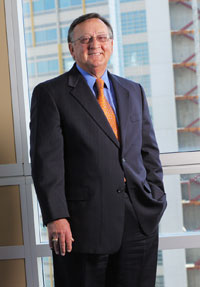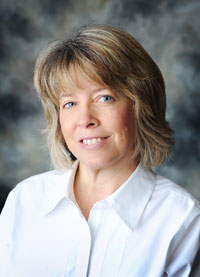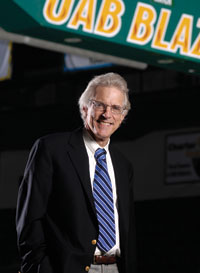Jon Vice: Making Life Good
By Norma Butterworth-McKittrick
 During his four decades in health administration, Jon Vice has learned that the best way to get a hospital to perform is to help it get happy. The affable longtime president and CEO of Children’s Hospital and Health System of Wisconsin sums up his job this way: “I ask my staff to tell me what they need to do their jobs, and I get it for them.”
During his four decades in health administration, Jon Vice has learned that the best way to get a hospital to perform is to help it get happy. The affable longtime president and CEO of Children’s Hospital and Health System of Wisconsin sums up his job this way: “I ask my staff to tell me what they need to do their jobs, and I get it for them.”
When that happens, “the doctors are happy because they get the resources they need to take care of their patients, and that makes the patients and their families happy,” Vice explains. “The doctors earn money, the hospital earns money, and that makes everybody happy!”
Vice, who grew up in Pleasant Grove, Alabama, almost finished a master’s degree in counseling before he decided to join the family business: health care. His aunt Lenora Richards was a nurse in UAB’s ophthalmology department, and his aunt Lena Cody served as the personnel director at UAB Hospital, where his mother once worked in the billing office. His uncle and two other aunts also worked in Birmingham hospitals.
Vice enrolled in the master’s degree program in hospital and health administration at UAB in the early 1970s and soon found his calling in pediatric care. “Of all the hospitals in the area, I was assigned to work at Children’s—and I liked it,” he recalls.
Turnaround Master
After filling various positions at Children’s Hospital in Birmingham, Vice joined the staff of Children’s Hospital Medical Center in Cincinnati, Ohio, where he rose through the ranks to become COO. When his boss was called to Birmingham in 1976 to handle a crisis, he asked Vice to go with him. Vice points out that by the time he left Birmingham for Wisconsin three years later, “they were starting construction on a new patient tower at Children’s Hospital—so I think we were pretty successful.”
Vice also successfully turned things around at Wisconsin Children’s Hospital, which was facing a financial crisis when he joined the administrative staff in 1979. He took the hospital from the brink of bankruptcy to a position as one of the nation’s top-rated children’s medical centers. Along the way, he became known affectionately as “Mr. Children’s Hospital.”
“In my opinion, much of the progress made in pediatric hospital administration during the past 37 years is rooted in ideas, concepts, and causes that Jon Vice has fostered and often outright advocated and campaigned for among his contemporaries in the field,” says Howard W. Houser, Ph.D., associate dean of UAB’s School of Health Professions, who was serving as the chair of the hospital and health administration program when Vice enrolled at UAB.
Giving Back
Vice actively participates in the Children’s Miracle Network, the National Association of Children’s Hospitals and Related Institutions, and the UAB School of Health Professions Dean’s Advisory Board. He also serves as a preceptor for future health-care professionals from UAB and other schools. Vice’s example has clearly influenced his children: His son Jeff, who earned his master’s degree at UAB, is now on the administrative staff of Denver Children’s Hospital, and his daughter Jessica is currently a pediatric resident at Children’s Hospital of Wisconsin.
Even after so many years, Vice says that seeing young patients and their families and hearing about the challenges they face keeps him motivated. “I get tears in my eyes sometimes when I learn of their ordeals and some of the agonies,” he says, “but it’s inspiring to learn how they deal with adversity, and it makes me want to work that much harder to make things better for them.”
Deborah Wiebe, Ph.D.: Searching for the Seeds of Hope
By Cindy Riley
 Psychologist Deborah Wiebe, Ph.D., is hunting for happiness in some unlikely places. “I study what people do to keep themselves happy and healthy, particularly when they have reason not to be—like when they’re dealing with serious chronic illness,” explains Wiebe, a professor of health psychology at the University of Texas Southwestern Medical Center at Dallas.
Psychologist Deborah Wiebe, Ph.D., is hunting for happiness in some unlikely places. “I study what people do to keep themselves happy and healthy, particularly when they have reason not to be—like when they’re dealing with serious chronic illness,” explains Wiebe, a professor of health psychology at the University of Texas Southwestern Medical Center at Dallas.
“People are remarkably resilient. They seem to rise to the challenge. Positive emotions are a resource to help one cope, and I’m interested in understanding how people do that.”
Wiebe says much of her research focuses on how adolescents and their families manage type 1 diabetes. “Prior to adolescence, parents can be highly involved,” she says. “But during adolescence, their child spends more time away and eventually assumes responsibility for managing the illness. Families are trying to support the child’s normal development while keeping them physically healthy and helping them develop the skills to manage the illness independently. It’s a real challenge.”
The attraction of type 1 diabetes for Wiebe is that it is “an illness that can be managed if you understand it,” she says. “It’s a very psychological behavioral process that allows you to actually change its course over time. You can use this research to begin to help families.”
A Program Pioneer
Wiebe came to UAB to earn a doctoral degree in the new field of health psychology, but once she arrived in Birmingham, she broadened her horizons. “I met a professor who really wowed me in describing the synergy that exists between public health and health psychology,” she recalls. “So I went to the director of clinical training in psychology and asked whether I might obtain training in both areas. By the next semester, I was a graduate student in both programs and was the first to complete the joint Ph.D./M.P.H. training that is now a unique selling point of the medical psychology program at UAB.”
At the University of Utah and now at Texas Southwestern, Wiebe has built on that training by contributing noteworthy research to the field, publishing articles in prestigious journals and earning the UAB Department of Psychology’s Distinguished Alumnus Award last year. She and her husband, Stephen, also a professor at Texas Southwestern, are the parents of a nine-year-old daughter, Emma. Wiebe says they enjoy playing with the family dog, two cats, and three chickens, as well as taking part in outdoor activities. Still, work is never far from her thoughts.
“The field changes rapidly with emerging medical technologies,” she says. “It’s sometimes difficult to keep up with the explosion of information that’s available, but it’s never boring.”
Joel Hearn, D.M.D.: Dental Cheer
By Rosalind Fournier
 After graduating from the UAB School of Dentistry in 1972, followed by a three-year stint in the U.S. Air Force, Joel Hearn, D.M.D., found himself with two obvious options—return to the Air Force or enter private practice. But there was also another possibility: He could pursue a longtime dream and become a professional musician.
After graduating from the UAB School of Dentistry in 1972, followed by a three-year stint in the U.S. Air Force, Joel Hearn, D.M.D., found himself with two obvious options—return to the Air Force or enter private practice. But there was also another possibility: He could pursue a longtime dream and become a professional musician.
In the end he opted for door number three—briefly. “I spent six months playing the piano in restaurants in Charleston, South Carolina,” says Hearn, who now has a thriving endodontics practice in Florence, Alabama. “That’s when dentistry started to look pretty good, because music… well, when you have to do it, it’s not as much fun.”
When he left the full-time music scene, Hearn headed for Tampa, where he spent three years practicing general dentistry. But he had always wanted a more specialized practice, so in 1978 he returned to his alma mater for a residency in the Department of Endodontics. Hearn describes this interlude as among the best two years of his life. “It was a source of great education, mentorship, and long-lasting friendships,” he says.
It also gave Hearn a chance to break out his musical talents once again. While he was in Birmingham, the university held a contest to generate UAB’s first official fight song, which would be used as a rallying cry for the new basketball program.
“They offered a prize of $150,” Hearn recalls. “I was broke at the time, so I thought, ‘Hey, I could do this.’” Hearn’s composition was a change from his usual musical fare, but it managed to beat out pieces from a number of music students and professional musicians. Thinking it “a hoot” that Hearn had won, his fellow dental residents and even the department chair followed along as he went to collect his prize. “We all go down there,” Hearn remembers, “and they had not only a photographer but the whole band to play the song. It was crazy, but 30 years later I still get to hear it on national television.”
Comforts of Home
Hearn planned to return to Tampa when his residency was over, but a group of Florence-area dentists were actively recruiting him, and his brother, Thomas—who was senior vice president for UAB’s University College—persuaded him to stay closer to home.
That’s how a former musician ended up serving as Florence’s one and only endondontist for 14 years, working 10- and 12-hour days to keep up with demand before two other specialists opened nearby practices. Their arrival, Hearn says, has afforded him some freedom to enjoy other pursuits, such as spending time with his wife, Daryl, on their boat at Wilson Lake, and moonlighting with a Tuscaloosa-based band on occasion.
He’s even become an unofficial ambassador for his adopted hometown: While serving a term as president of the Alabama Dental Association, Hearn eschewed the usual tradition of holding the group’s annual leadership conference at some far-flung locale and instead hosted its members in Florence, where many had never even visited.
“I feel fortunate to have a great family, wonderful friends, and a great job,” Hearn says. “You can’t ask for more than that.”